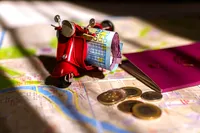Currency in France
What Currency Does France Use Now

Known for its romance, sophistication and allure, France is one of the most famous tourist destinations in the world. One key aspect to understand before touring the country is its economic system, particularly its currency. Since the beginning of 2002, France bid adieu to their beloved French Franc and embraced the Euro (€) as part of their integration into the Eurozone.
The Euro is the official currency in 19 of the 27 member states of the European Union, including France. It's divided into 100 smaller units, commonly known as cents. Coins come in denominations of 1, 2, 5, 10, 20 and 50 cents, and 1 and 2 Euro coins. Banknotes are in denominations of 5, 10, 20, 50, 100, 200 and 500 Euros.
Credit and Debit Cards in France

Credit and debit cards are widely accepted in France, irrespective of whether you're making purchases in big cities like Paris, Marseille or in smaller towns across the countryside. Visa, MasterCard, and American Express are accepted in most places, though American Express might not be welcomed in some smaller shops or cafés due to higher processing fees.
Chip and PIN style credit and debit cards, also known globally as EMV cards (Europay, Mastercard and Visa), are the standard in France. This applies for most of Europe as well. If you are travelling from a country that doesn't use EMV cards, particularly the United States, it's recommended to get one before your trip or ensure that your magnetic stripe card is accepted.
Using Cash in France
Despite being a modern and technologically advanced country, France still holds on to the classic practice of using cash. Particularly in smaller towns, rural areas and outdoor markets, cash is king. Most people carry some cash on them, as some tiny shops, cafés and vendors don't accept credit cards, or require a minimum purchase amount to pay by card.
It is also common to tip with cash in France, as service charge is typically included in the bill at restaurants, but it is customary to round up or leave an extra euro or two in cash.
ATMs in France

Locally known as 'Distributeurs Automatiques de Billets' (DAB), ATMs in France are plentiful and easy to navigate, even for non-French speakers as most have an English language option. These machines accept all major credit and debit cards, recognising international banking systems. Keep in mind, however, that your home bank might charge fees for transactions abroad.
Most ATMs in France will allow you to withdraw up to 300 Euros per day. It's advisable not to rely only on ATMs for cash when travelling, as machines can be out of order, or emptied over a weekend or public holiday.
Bank Hours
Aside from understanding the currency and various modes of transaction, it's crucial to note the bank hours in France. Generally, banks in France are open from 9:00am to 4:30 or 5:00pm, Monday to Friday. Most banks close for lunch around 12pm or 1pm and reopen around 1:30 or 2pm.
Some banks may open on Saturday mornings, but this isn't standard for all. It's always advisable to check the opening hours of the specific bank branch. Keep in mind that during public holidays in France, banks will be closed on these designated days.
Knowing the financial landscape of any country can significantly enhance your experience when visiting. With a firm knowledge of France's currency system, card policies, cash culture, ATM accessibility, and banking hours, you should be properly equipped to explore that mesmerizing French charm with confidence and ease.
